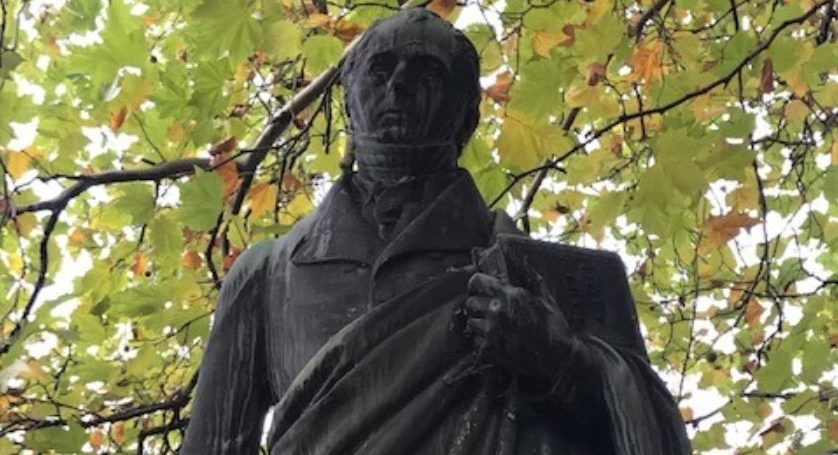‘Hail to the Lord’s anointed’: a message of praise and hope
Hymns
“ ‘Hail to the Lord’s anointed’ is a five-verse setting of Psalm 72 by Scottish hymn-writer, poet and editor James Montgomery, who grew up in the north of England in a family who worshipped in the Moravian Brethren tradition,” says The Rev’d Dr David Cole

Current tensions and conflicts are signs that we are living through a difficult period. Humanity is facing multiple challenges, including recurring natural disasters and the impacts of a damaged climate, the invasion of Ukraine, a civil war in Sudan, conflict in Palestine and Israel and the ongoing impacts of colonialism on First Peoples in Australia and internationally.
Conversations about such traumatic matters are often played out on social media and in the news in untruthful and oversimplified ways — seeking to divide. So it is that we see a rise in racism and distrust. These are challenging times for humanity and the natural world.
We are therefore thankful once again for messages of forgiveness, compassion, justice, truth and hope that come into focus in the season of Advent. One of the most well-known Advent hymns has a text that is 200 years old, and a tune much older than that. It reminds us of the promise of hope in the coming of the Christ, both as a helpless child and as the One who ushers in and fulfils the promised Kingdom of God.
‘Hail to the Lord’s anointed’ is a five-verse setting of Psalm 72 by Scottish hymn-writer, poet and editor James Montgomery, who grew up in the north of England in a family who worshipped in the Moravian Brethren tradition.
Finally settling in Sheffield in a time of great social and political conservatism, Montgomery (1771-1854) became owner and editor of a newspaper known for its social conscience, calling for the abolition of slavery and defending other human rights. His commitment to justice resulted in two prison sentences, one for printing a song celebrating the Fall of the Bastille and another for criticising the forceful dispersal of a political demonstration in his city.
Advertisement
Montgomery played an important role with The Rev’d Thomas Cotterill in officially introducing into Anglican worship the singing of texts interpreting the Bible in poetic forms rather than strictly using only words of the Psalms. His more than 300 hymn texts include ‘Angels from the realms of glory’, ‘God is our strong salvation’ and ‘Stand up and bless the Lord’. They continue to make an important contribution to Christian worship across denominations, demonstrating Montgomery’s social conscience and his talent for writing poetry that made for good congregational singing. These qualities are evident in the words of this wonderful Advent song, originally written for Christmas Eve in 1821, and since published in many hymn books around the world.
James Montgomery is remembered in a Sheffield Cathedral stained-glass window and in a cathedral forecourt statue.
Montgomery’s hymn (Together in Song #275) is useful beyond Advent, serving as a wonderful song at Epiphany and on other occasions. In five carefully crafted verses his text, which is based on Psalm 72, celebrates the Advent promise of the coming of the Lord’s anointed One, reminding us of the Christian’s task of self-reformation, and of the need to work towards making the Kingdom of God a living experience in our troubled world.
Advertisement
The first verse emphasises the Messiah’s role in breaking oppression, freeing captives and administering justice equitably. We pray daily that this will come for our sisters and brothers in war-torn places and for victims and survivors of domestic violence.
The message of the second verse is that the Lord comes with help and mercy for all who are suffering, and for those caught in poverty: central to the Church’s mission in the world. His arrival brings light to those in darkness — the great proclamation of Christianity through the ages.
The third verse brings a message of hope for us and our natural environment, and for those who long for love, joy, hope and peace to return to their daily lives. Verse 4 bring us a vision of the fulfilment of God’s will in our world, of a glorious future, and the eternal rule of love.
The hymn is both a promise and a challenge. The promise is of a future in which God’s Kingdom is realised. It is a promise built on our recognition that a loving God is with us through the darkest times and the most difficult situations. The challenge is for us to remember that our words as Kingdom builders need to be followed through with deeds in our private and professional lives, in the way our parishes, schools and other ministries function, and in the way we interact with others.
Related Story
 Hymns
Hymns
‘God, whose love is everywhere’: a Christmas song
This hymn works well on several levels in its clever combination with the tune Cruger from Johann Crüger’s 1640 collection. Each verse is easy to sing, with the tune of the first line repeated in the second line in each case. The tune for the third and fourth lines balances the first two in a rather more introspective way, and the tune for the final two lines provides a sense of positive fulfilment and promise. Tune and text reinforce each other very successfully.
The wonderful hope of Advent underscores the strength of the Christian message in our local community and in the wider world. When others despair, we can bring the optimism of a hopeful future in God’s care. When untruths and division spread, we are commissioned to exercise love and compassion, generosity and kindness. When peace seems so far away, we know that God’s will is for us to keep modelling how we can all live together, cooperate for the good of all, and demonstrate that the way forward is love.




